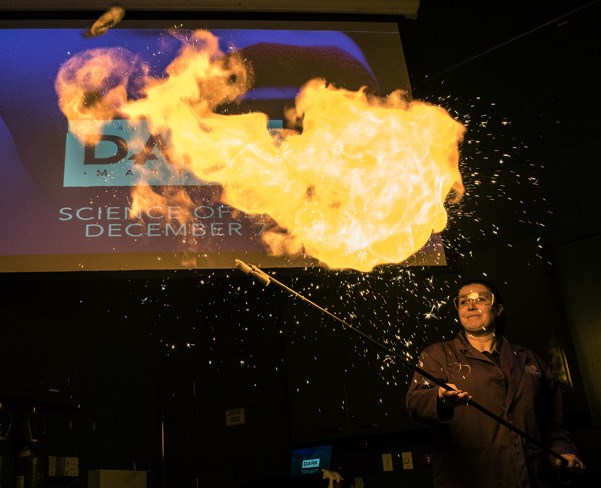Hundreds of people are expected to come to the Telus World of Science Edmonton Thursday for the Science of Sex event.
Hundreds of people are expected to come to the Telus World of Science Edmonton Thursday for the Science of Sex event. The event, now in its third iteration, is part of the science centre’s ongoing Dark Matters series, an adults-only affair where people gather to discuss science over drinks.
This year’s event will feature a variety of speakers on sex and science, said staff scientist Marie McConnell. Archaeologist Phil Currie will talk about sex and dinosaurs, for example, while biologist Heather Proctor will discuss the (somewhat horrifying) world of invertebrate sex.
Guests will also get to exchange fluids via eyedropper and bottle to simulate the spread of sexually transmitted diseases, race tiny sperm-bots through a uterus-inspired race-track, and build their own model penis.
Although she was predicting a sell-out, staff scientist Marie McConnell said there might still be a few tickets available today and at the door.
Mine’s bigger
“Everyone wants a license to talk about sex,” McConnell said, and there’s lots of science in it to talk about.
There’s the materials science of sex toys, for example, the psychology of relationships, the hows and whys of reproduction, and the genitalia arms race.
“One of my favourite topics to explore within the science of sex is comparing genitalia across the animal kingdom,” McConnell said.
Females often develop complex uteruses to ensure they receive only the best sperm for their eggs, while males develop bizarre penises to maximize their reproductive success, she explained.
“Some of them break off and get stuck inside the female,” McConnell said, blocking off other mates, or have barbs that injure the female so she can’t mate again. The male mallard duck has developed a huge corkscrew-shaped organ designed to navigate the female’s labyrinthine genitals.
Guests this Thursday will be challenged to build their own model penises using cardboard, pool noodles and other scraps that are able to inseminate specific animals, McConnell said.
Currie said researchers don’t know much about dinosaur genitals, as they’re not typically preserved as fossils, but said they were likely similar to those of their descendants, birds and reptiles.
“Instead of being one penis, it’s in fact two structures that fold inside the animal so you don’t see it externally until it’s mating.”
Currie said archaeologists have found mummified dinosaurs, so there’s a chance we might find preserved dinosaur genitals in the future.
When it comes to the human penis, researchers have found that it’s not actually very good at stimulating the human vagina, said Cory Hrushka, who will speak on his experiences as one of Edmonton’s two certified sex therapists at Thursday’s event.
“Generally speaking, when men and women masturbate it takes about the same about of time,” he said, but when they have sex, women take much longer to reach orgasm.
This is in part due to the design of the penis, Hrushka explained. Most of this organ’s touch receptors are in the tip, so it’s constantly stimulated as it moves around in the vagina. Women, in contrast, have most of their touch receptors in the clitoris, which is outside the vagina. Once the penis is in the vagina, it’s no longer touching the clitoris and isn’t doing much to stimulate the woman.
It’s important for people to talk about sex, as not doing so leads to stereotypes, bad relationships, and sexually transmitted disease, McConnell said. Discussing it can teach people to have better sex, “which is great for everyone.”
Dark Matters runs from 7 to 10 p.m. this Dec. 7. Tickets are $19.95 in advance and $25.95 at the door. Guests are encouraged to call
780-451-3344 to see if any are still available.




